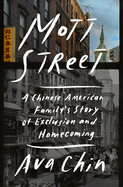
Writer-professor Ava Chin skillfully mixed food and (maternal) family in her award-winning 2014 book, Eating Wildly. Her exceptional sophomore memoir, Mott Street, reads like a companion text, inspired by an adult reconnection with her estranged father, who abandoned his wife long before his daughter formed any memories of him. Mott Street is an expansive personal history that originates in China's Pearl River Delta in the 1860s and eventually leads to a six-story building at 37 Mott Street--considered "the height of luxury" when it was built in 1915--in New York City's Chinatown, where both of Chin's parents were born. For more than a century, the Chins and Ng-Doshims called the red-brick tenement home; Chin's writing studio is now on the fourth floor, making her a fourth-generation resident.
In 1882, the Chinese Exclusion Act became the first U.S. immigration law specifically targeting race. Its repercussions hit Chin's ancestors--and thousands of others--truncating families, creating so-called paper sons, and transforming immigrant narratives into "complete and utter fiction," which Chin spent decades unraveling across oceans and continents. From historical erasure to her own separation from her paternal family, Chin discovers that "when you're Chinese in America, with roots that stretch back to the Exclusion era, it is the historical record that is a fabulist fabrication, and the oral stories, passed down from generation to generation, like rare, evolving heirlooms, that ultimately hold the keys to the truth." Enhanced with rare photographs and documents, Chin achieves on the page what wasn't possible in her own actual life: to entwine her parentage into a single enduring story of abiding resilience and indelible inspiration. --Terry Hong, BookDragon

